So, you want to make a string uppercase in Python? That’s good, because we will show you how, and it’s straightforward and super important.
Making a string uppercase in Python is straightforward, thanks to Python’s built-in methods designed for string manipulation.
Python offers several built-in methods to achieve this, each tailored for specific use cases. These include the upper(), capitalize(), title(), and swapcase() methods, as well as advanced techniques like regular expressions and string formatting.
This guide delves into each method, clearly understanding their functionalities and appropriate usage scenarios.
So, whether you’re a beginner or an experienced developer, mastering these techniques is crucial for efficient text processing.
Let’s get started!
Overview of Case Conversion in Python

In Python, you can use various functions and techniques to convert strings to uppercase. Let us explore how to execute some code.
Using str instance Method
The default built-in “string” class (str) has practical proper methods for convertscase:
upper(): Convert all text in a string to uppercase.
title(): Convert all words in a string to the title case.
capitalize(): Capitalize only the first word of a string.
swapcase(): Swap lowercase letters with their uppercase counterparts and vice versa.
Advanced Techniques:
regular expressions: Python’s re module offers regular expressions for complex string manipulations, including case conversion based on specific patterns.
String Formatting with str.format() or f-Strings: Both of these methods can be utilized for sophisticated text manipulation, including integrating case conversion within broader string processing task
Applying these methods per your requirements allows you to can easily modify and prepare your text for further handling.
Here’s a brief explanation and examples for each method:
1. String Class Upper Method

The Python string class provides the upper() method to produce an uppercase version of a given string. This method converts all alphabetic characters in the string to their uppercase counterparts.
It’s important to remember that the upper() method does not modify the original string. Strings in Python are immutable, meaning they cannot be changed after creation. Instead, upper() returns a new string with all the alphabetic characters in uppercase.
Example of Using upper()
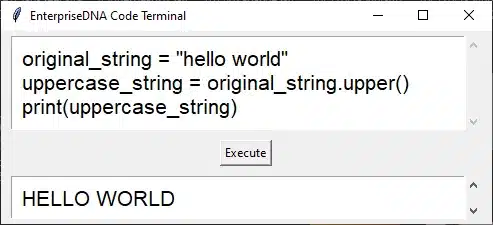
Characteristics of the upper method:
The upper() method converts all alphabetic characters in a string into uppercase.
It returns a new string, leaving the original string unchanged.
The method does not accept any arguments.
Non-alphabetic characters in the string remain unaffected.
Now, let’s delve into the simplicity and efficiency of Python’s string class upper method, a fundamental tool for text transformation.
2. String Class Capitalize Method

The Python string class offers the capitalize() method to convert the first letter of a string to uppercase. This is beneficial because it ensures that a string starts with a capital letter.
Like upper(), the capitalize() method does not alter the original string. Instead, it returns a new string with the first character capitalized and the remaining characters unchanged.
This method is useful for capitalizing the first letter of sentences or names but is not designed for capitalizing entire words or sentences.
Example of Using capitalize()
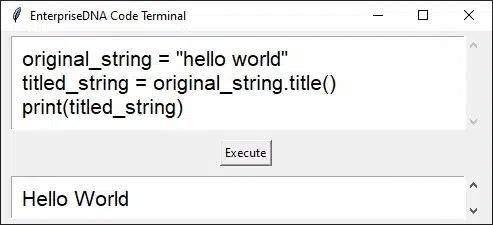
Characteristics of the capitalize method:
It returns a new string with the first character in uppercase.
The original string remains unmodified.
It remains unchanged if the string starts with a numeral or a non-alphabetic character.
These two methods are essential tools for handling string case conversions in Python. Continue reading to explore more methods and their unique functionality with case conversions.
Moving forward, let’s examine the title method, an ideal solution for presenting each word distinctively in Python strings.
3. String Class Title Method

The title() method provided by the Python string class is designed to convert the first character of each word in a string to uppercase, making it particularly useful for formatting titles or headings.
This method ensures that each word in a string begins with a capital letter, with the remaining characters in lowercase.
As with other string methods in Python, title() does not alter the original string. Since strings are immutable, it returns a new string with each word’s first character capitalized.
Example of Using title()
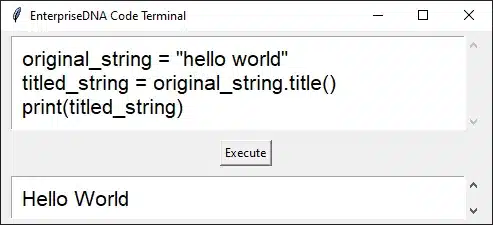
Key points about the title method:
It capitalizes the first letter of each word in a string.
The method returns a new string and leaves the original string unchanged.
Non-alphabetic characters are not affected, and words following such characters are capitalized.
Now, let’s shift our focus to the swapcase method, which adeptly inverts the case of each character in Python strings.
4. String Class Swapcase Method

The Python string class includes the swapcase() method, which switches the case of each letter in a string. Lowercase letters become uppercase, and uppercase letters become lowercase. This method is beneficial for inverting the case of a string.
Like other string methods, swapcase() returns a new string with the swapped case and does not modify the original string.
Example of Using swapcase()
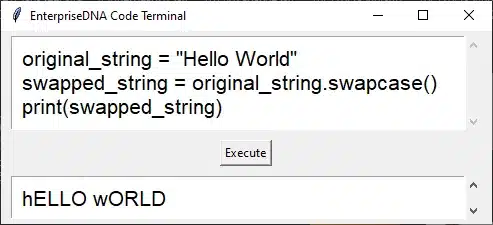
Characteristics of the swapcase method:
It inverts the case of each letter in the string.
The original string remains unaffected, and a new string is returned.
Non-alphabetic characters in the string are not altered.
These methods, title() and swapcase(), along with upper() and capitalize(), provide a comprehensive toolkit for string case manipulation in Python, enabling various text formatting and processing tasks.
Additional Ways to make a string uppercase in Python:
Regular Expressions
String Formatting with str.format() or f-Strings
Let’s take a deeper look. Additional techniques can be employed, such as using regular expressions and string formatting. Let’s delve into these methods.
Let’s dive into the realm of regular expressions in Python, offering nuanced and pattern-based approaches to uppercase conversion.
5. Regular Expressions
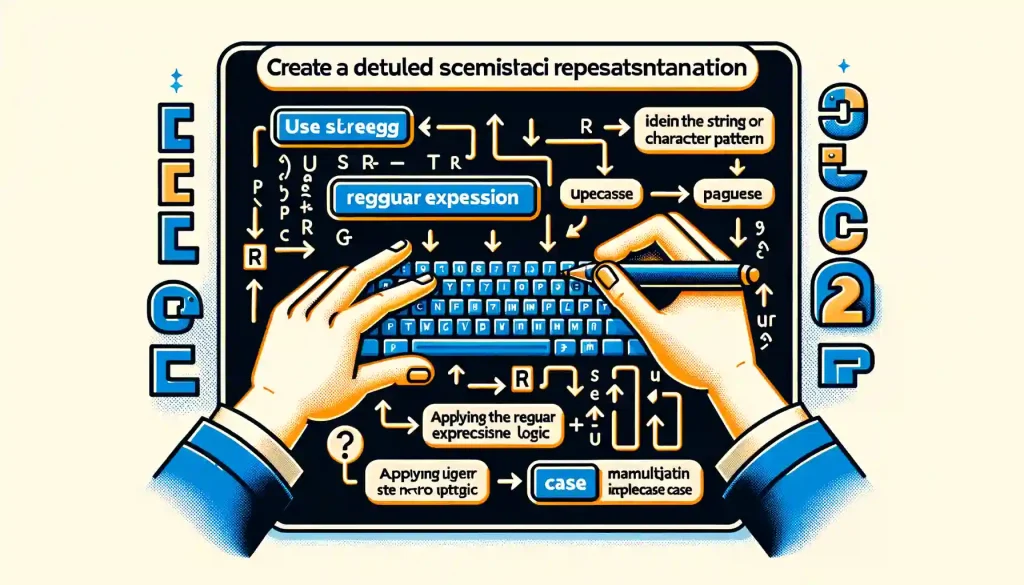
Regular expressions (regex) in Python, provided by the re module, offer a powerful way to perform complex string manipulations, including case conversions.
They are beneficial when applying case conversion based on specific patterns in a string.
Example of Using Regular Expression
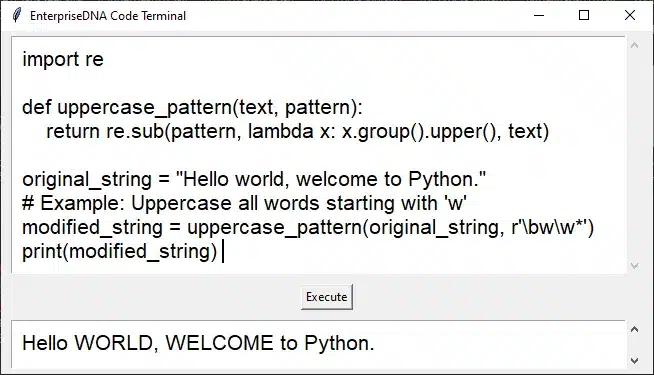
In this example, the uppercase_pattern function uses re.sub() to search for a pattern (words starting with ‘w’) and apply the upper() method to those specific matches.
Python’s regular expressions provide nuanced and pattern-based methods for converting text to uppercase.n.
For our last example, let’s explore string formatting with str.format() and f-strings, blending case conversion with advanced string manipulation in Python.
6. String Formatting with str.format() or f-Strings

String formatting methods like str.format() or f-strings (formatted string literals) can also be used to manipulate and combine strings, including changing their case.
Example of Using String Formatting for Case Conversion
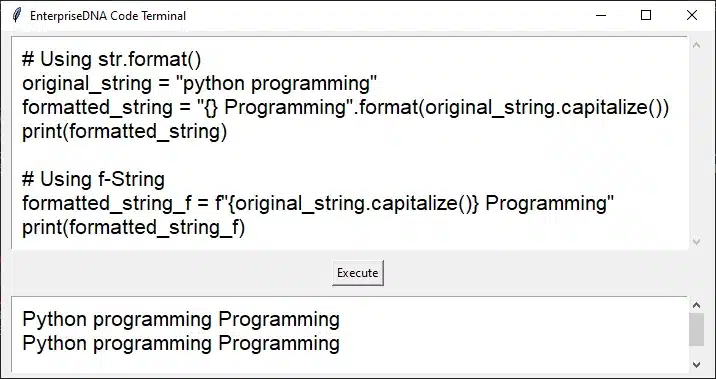
In these examples, string form combines a capitalized string with other text.
In these examples, we see how string formatting seamlessly integrates with case conversion, illustrating Python’s capability to elegantly combine and manipulate text data.
Finally, let’s reflect on some of our main points.
Final Thoughts

In Python, string case conversion methods like upper(), capitalize(), title(), and swapcase() offer a versatile way to manipulate text.
So, whether you’re formatting data for display, standardizing text input, or preparing strings for comparison, these methods provide a simple and effective solution.
Remember, these methods do not change the original string but return a new modified string, respecting Python’s approach to strings as immutable objects. This feature ensures the integrity of your original data while allowing for flexible manipulation.
Understanding and utilizing these string methods can greatly enhance the efficiency and readability of your Python code, especially in applications involving text processing and data analysis.
Don’t forget to check out EnterpriseDNA’s YouTube channel for the latest AI tool that simplifies Python functions.
Frequently Asked Questions
Do These String Methods Work with Non-English Alphabets?
Yes, methods like upper(), capitalize(), title(), and swapcase() work with non-English alphabets as well, as long as the characters are part of the Unicode character set, which Python strings support.
What Happens If I Use These Methods on an Empty String?
If you apply these methods to an empty string, you will receive an empty string in return. These methods do not throw errors or exceptions when applied to empty strings.
Can I Chain These Methods Together?
Yes, you can chain these methods. For example, string.lower().title() will first convert the string to lowercase and then apply title casing.
How Do These Methods Handle Special Characters or Numbers?
These case conversion methods do not affect special characters and numbers within a string. They remain unchanged in the resulting string.
Are These Methods Efficient for Large Strings?
These methods are generally efficient for large strings. However, additional optimization techniques might be necessary for extensive significant text in scenarios demanding high performance.
How does Python’s upper() function affect the lowercase characters in a string?
The upper() function in Python converts all lowercase characters in a string to uppercase, leaving non-alphabetical characters unchanged.
Can Python’s upper() and lower() methods convert characters within a string variable?
Yes, Python’s upper() and lower() methods can be used to convert the case of characters within a string variable. For example, my_string = “Hello World”; my_string.upper() will convert all characters to uppercase.
What syntax should be used to convert a string to uppercase or lowercase in Python?
The syntax for converting a string to uppercase is string.upper(), and to lowercase is string.lower(). These are built-in Python functions that modify the case of the string.
Does Python’s upper() function work with strings containing both uppercase and lowercase characters?
Yes, Python’s upper() function converts all lowercase characters in a string to uppercase, regardless of the presence of existing uppercase characters.
Can I use Python’s upper() and lower() methods to convert characters in two separate strings simultaneously?
You can apply upper() and lower() to two strings separately, but not simultaneously. For each string, you would need to call the method individually, like string1.upper() and string2.lower().
Will Python’s upper() method return False for any input?
Python’s upper() method does not return False; it always returns a new string with all lowercase characters converted to uppercase. If there are no lowercase characters, it returns the original string.
How can I convert only specific characters to uppercase in a Python string?
To convert specific characters to uppercase, you would need to isolate those characters, apply upper() to them, and then reconstruct the string. Python does not provide a built-in method to uppercase only specific characters directly.
Can Python’s upper() function convert all the characters in a string to upper case?
Yes, Python’s upper() function converts all the lowercase characters in a string to uppercase, leaving other characters unaffected.








